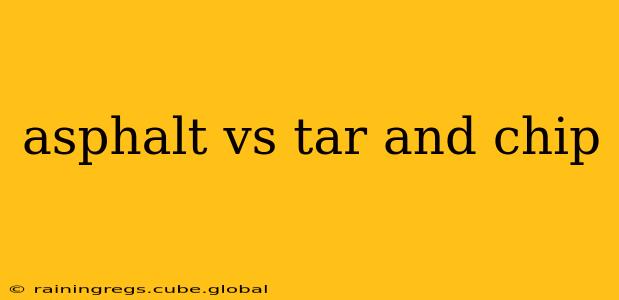Choosing the right pavement for your driveway, road, or parking lot can be a daunting task. Two common options are asphalt and tar and chip, each with its own set of advantages and disadvantages. This comprehensive guide will delve into the key differences between asphalt and tar and chip, helping you make an informed decision based on your specific needs and budget.
What is Asphalt?
Asphalt, also known as blacktop, is a ubiquitous paving material composed of aggregates (like gravel and sand) bound together with bitumen, a petroleum-derived binder. It's known for its smooth, durable surface, relatively quick installation, and ease of maintenance. Modern asphalt formulations often incorporate polymers to enhance its flexibility and longevity, further improving its resistance to cracking and weathering.
What is Tar and Chip?
Tar and chip, sometimes called chip seal, is a more economical paving option. It consists of a layer of asphalt emulsion (a liquid form of bitumen) sprayed onto a prepared surface, followed by an application of small stones or chips. These chips embed themselves in the emulsion, creating a textured, durable surface. While less expensive initially, it requires more maintenance over its lifespan.
Asphalt vs. Tar and Chip: A Detailed Comparison
Here's a breakdown comparing the two paving options across several key factors:
Cost:
- Asphalt: Generally more expensive upfront due to the higher material and labor costs involved in the smoother, more uniform application process.
- Tar and Chip: Significantly less expensive initially, making it a budget-friendly choice for large areas or projects with limited funding.
Durability:
- Asphalt: Offers superior durability and longevity, typically lasting 15-20 years or more with proper maintenance. Its smooth surface is less susceptible to damage from heavy traffic and weathering.
- Tar and Chip: Less durable than asphalt, typically lasting 3-5 years before requiring resealing or repair. The textured surface is more prone to chipping and wear, particularly in high-traffic areas.
Maintenance:
- Asphalt: Requires periodic sealing (every 3-5 years) to protect against oxidation and water damage, extending its lifespan. Pothole repairs may be necessary.
- Tar and Chip: Requires more frequent maintenance, including resealing every 3-5 years. The loose chips can require periodic sweeping to maintain a clean surface.
Appearance:
- Asphalt: Provides a smooth, uniform, and aesthetically pleasing surface, ideal for driveways, parking lots, and roads where a polished look is desired.
- Tar and Chip: Presents a textured, more rustic appearance. While it can be attractive in some settings (e.g., rural roads), it might not be suitable for all applications.
Driving Experience:
- Asphalt: Offers a smooth and comfortable driving experience.
- Tar and Chip: Provides a rougher, less comfortable driving experience due to its textured surface.
Which is Right for You?
The best choice depends on your priorities:
-
Choose asphalt if: You prioritize longevity, durability, a smooth driving surface, and a polished appearance, even if it means a higher upfront cost. This is ideal for driveways, parking lots that see heavy traffic, and main roads.
-
Choose tar and chip if: You're on a tight budget and need a cost-effective paving solution, and are willing to accept shorter lifespan and more frequent maintenance. This is often suitable for less-traveled roads, rural areas, or temporary paving needs.
How Long Does Tar and Chip Last?
H2: How Long Does Tar and Chip Last? Tar and chip typically lasts 3-5 years before needing resealing or repair, significantly shorter than asphalt's lifespan. The longevity depends on factors like traffic volume, weather conditions, and the quality of the initial application.
Is Tar and Chip Good for Driveways?
H2: Is Tar and Chip Good for Driveways? Tar and chip is generally not recommended for driveways due to its shorter lifespan, rougher surface, and higher maintenance needs compared to asphalt. The constant wear and tear from vehicle traffic will quickly degrade the surface.
Is Asphalt Better Than Tar and Chip?
H2: Is Asphalt Better Than Tar and Chip? In most cases, asphalt is superior to tar and chip due to its increased durability, longer lifespan, smoother surface, and overall better aesthetic appeal. However, the higher initial cost should be considered.
By carefully weighing the pros and cons of each option and considering your specific needs and budget, you can make an informed decision about whether asphalt or tar and chip is the best paving solution for your project. Remember to always consult with a qualified paving contractor to discuss your options and receive professional advice.
